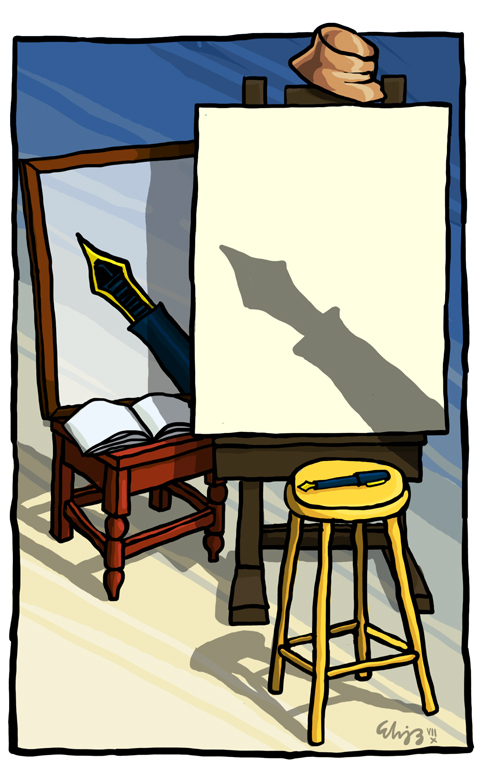In this title i wrote word Applaying with strike out letter “a” and “p.” So this title could be read “playing.” And i also put “second a” in two brackets. It means this title can be read “applying.” Then this title has ambigous meaning, between applying and playing sous rature in al-Qur’an. Well, what i did to this title is the little sample of sous rature.
Sous rature was first introduced by Heidegger. He always gives "a cross" (Überqueren) the word whose meaning is considered to be inadequate, but still useful. Meanwhile, Husserl, in the same spirit, also introduces a method to put words in brackets (einklamerung). The purpose of einklamerung is suspending while the word or object that is not adequate. This method is used by Derrida radically. Derrida crossing out what he thinks leads to a certain presence.
Hereinafter, The Qur'an which is believed to be the truth (haqq) of God must be exploited in order to produce meaning. In treating the text of Qur’an, many Muslims tend to interpret it according to their ideological interests. The verses of the Qur’an that literally defend them will be swallowed whole. But if the verses contradicted with their ideology, they interpret (doing ta’wil toward) them. So they produce meaning of the Qur'an in accordance with their "ideological passion". This is where the word of God "Nobody touches the Qur'an except the sacred"[1] found its momentum.
People often feel satisfied with the meanings they have acquired, including the Quran. The satisfaction makes them shut out the possibility of another meaning. Meaning that they hold tight became the only presence behind the text. Certainty of meaning is a must for the seeker of truth. Therefore, the truth becomes a major problem of the philosophical discourse.
Many people dispute about what the meaning behind a text. They insisted on their each opinion and blaming each other. Because the thirst for meaning, interpreters often "raping" the text to produce meaning through his thoughts. People too often "read" so that they forgot to "do not read." People too often think that they forget to stop thinking. They argue too much that they forget to be quiet.
As expressed by Heidegger, in silence, we could hear the sound of "Being" (Sein) reveals itself. Silence means "strike out" any pre-understandings that covering our thinking. So, quietly allowing us to feel how the “word moment” happened, like an experience of 'Umar bin Khattab when he read a fragment of surah Thaha.
By sousrature-ing all of our pre-understandings, we try to purify ourselves from the interests of some ideologies before "touching" the Qur’an. To effort gaining something as such (das ding an sich), we should also give a cross to several temporal phenomena which envelop it. Thus, the meaning is not result of our subjectivity, but it’s gained by allowing text (al-Qur’ân) speak itself.
Even as a consequence of sous rature, we also have to "write off" our own meaning that we've gained. Thus, the meaning is not the final outcome. By applying sous rature on the text, it means that we have been involved in neverending games. Because every meaning has a possible of right and wrong, then the interpretation must respect the other interpretations.
Sous rature also help us to find —using Arkoun’s term— "the unthinkable" things in ['Ulum] al-Qur'ân. Because according to Arkoun, there must be something reduced each time the text (al-Qur’ân) is transforming.
A little sample indication of sous rature can be applied in al-Qur’ân is at part of seventh verse of surah Ali ‘Imran (3):
وَما يَعْلَمُ تَأْوِيلَهُ إِلاَّ اللَّهُ ﻤ وَالرَّاسِخُونَ فِي الْعِلْمِ يَقُولُونَ آمَنَّا بِهِ كُلٌّ مِنْ عِنْدِ رَبِّنا
In our mushhaf, there is sign of waqf lazim (symbolized by ” ﻤ”) after word “illa-Llâh.” In al-‘ilmu al-tajwid (knowledge that regulate how to recite al-Qur’ân), waqf lazim means we must stop our reciting. Then the word after, that’s “wa al-râsikhûna” must became a new mubtada’ (subject). Based on this reciting, Asy’ariyyah people argue that no one knows the meaning (ta’wîl) of mutasyabihât verses (ambiguous verses) but only Allah ‘azza wa jalla. Well, by applying sous rature on that waqf sign, we should give a cross on that sign. Therefore, word “wa al-râsikhûna” need not to be mubtada’, but it could be ma’thuf (conjuncted word). Consequently, the meaning changes to be “no one knows ta’wîl of mutasyabihât verses but Allah and some people who have very deep knowledge.” And this course was allowed by Wahbah al-Zuhayli in his book, al-Tafsîr al-Munîr.
If so, it means there are some punctuation marks of al-Qur’ân that have character of ijtihady and still debatable. Then. I propose question, in al-Qur’ân, what things that sous rature could be applied on? Is it limited just in waqf sign or can spread to other punctuation marks like dot and harakah or even ‘Ulum al-Qur’ân as studies to learn al-Qur’ân?
[1] لا يمسّه إلاّ المطهّرون see: QS. Al-Waqi’ah (56): 79

Tidak ada komentar:
Posting Komentar